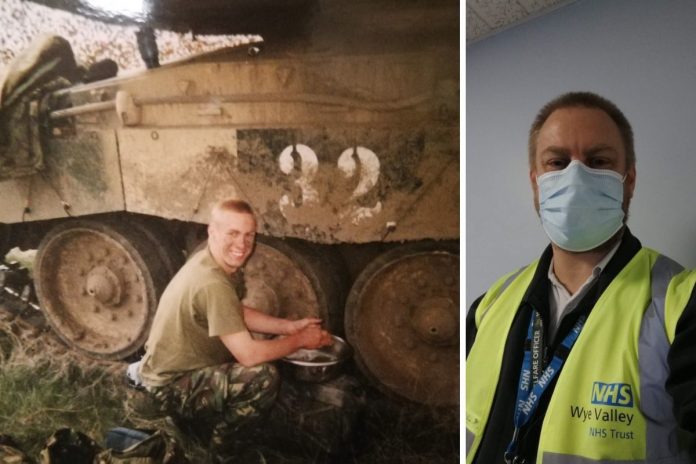An IRAQ war veteran has swapped the battlefield for Hereford County Hospital, where he’s proud to once again serve the country by helping fight the coronavirus.
Ashley Winter, 38, whose military career ended due to degenerative eye disease, is now a social worker with the Defense Medical Welfare Service, working alongside the NHS in Herefordshire.
Ashley, who served in both regular duty and full-time reserves with the Queen’s Royal Hussars for 14 years, has been at the center of community support for the pandemic, helping vulnerable and protective patients with door-to-door visits, grocery delivery and medication deliveries.
He is also a volunteer hospital worker at Hereford County Hospital, helping the vaccination team prepare equipment and ensure the smooth transition of patients through the vaccination process.
The former Corporal and Challenger tank crewmember, who is from Birmingham and now lives in Hereford, can see many parallels between the stress NHS workers have been exposed to due to the pandemic and what military personnel go through when deployed in a conflict , noted in Iraq and Kosovo. He also says that his military training prepared him well for his role in this new battle.
His own trauma stems from being told in 2010 that he was unavailable due to his diagnosis of keratoconus causing photosensitivity, pain, visual disturbances, swimmers, migraines and headaches. Ashley began a career in telecommunications but had difficulty working with the equipment and cables that were part of his job due to his eye condition.
This resulted in a number of mishaps, first when he was trying to crash his van to give himself an excuse not to go back to work, and second when he was on a third floor windowsill and it didn’t know how he got there.
Fortunately, after that final incident, he found the medications, therapies, and support he needed to help him after he was diagnosed with Adjustment Sequence, Anxiety, and Depression. Help for Heroes was part of this by providing mental health support through the Hidden Wounds service to help him regain the camaraderie he had lost from the armed forces through his community activity and also to support his family. After he was offered his job at DMWS, everything finally clicked together.
Commenting on his military experience, Ashley said, “Since I have to deal with such intense and pressurized times, my army training is of great help. That means I work in a disciplined way to make sure things happen when they are needed, and we’re trained to solve problems, manage logistics, and make quick decisions.
“I also feel well equipped to work with people from all walks of life and with different seniorities, and I know how to ensure that everyone is following procedures for their own safety. What was great is to see that by helping with the smooth running of the vaccination program I put pressure on the vaccination team so they can only focus on the work at hand. ”
He believes what the NHS staff experienced was more stressful than a tour of the armed forces.
“When I went to Iraq it only took a limited amount of time (six months) and when you finished your day-to-day work all you had to do was take care of yourself,” he said.
“For frontline health teams, they work 12-hour shifts and live on adrenaline. Then they have to go home to their families and play their roles there too.
“There’s no decompression time to get things off your chest, and it’s been relentless for a year. There is no doubt that it is mentally challenging and everyone is exhausted. ”
Drawing on his own experience of dealing with mental trauma, he added, “The greatest lesson I have learned is that when you are suffering, you seek help. It is a sign of strength, not weakness, and no one should have to deal with it alone. Also, take ten minutes a day, whether you are reading, sitting alone in silence, or lighting a fire. It is very important to give yourself some breathing space. ”
Mel Waters, CEO of Help for Heroes, added, “Ashley is one of many veterans who redeemed their country in the nation’s fight against the coronavirus. It shows tremendous strength in the face of adversity and demonstrates the value our military heroes continue to bring to the community even after they retire. ”
Help for Heroes has created resources and expertise on the mental health of NHS workers and their families known as Lessons from the Battlefield. The charity is making existing Emotional Resilience resources – created in collaboration with wounded veterans and their loved ones – available online to support health care workers and family members as they share similarities with the intense daily stress of dealing with COVID. 19 (including exposure, working with PPE in challenging environments, and being away from loved ones).
Ashley wants NHS staff to know that there is life beyond trauma as he found it himself. Since beginning his own recovery journey, he has been nominated as a finalist for Model of the Year, English Veterans Awards (winner will be announced in September) and nominee for Inspiration of the Year at the Soldiering On Awards.
He tested himself for the Invictus Games, completed 24-hour long distance mountain bike races, participated in a dogsled expedition in the Arctic Circle, and became a Guinness world record breaker by running a blindfolded mile in 10 minutes . 11 seconds. He has also written a successful book, Keratoconus and I, about living with the visually impaired. His main goal in life is to show others that you can live a full and normal life, even when things go against you.
The lessons from the Battlefield resources can be found at helpforheroes.org.uk/what-we-do/lessons-from-the-battlefield.

